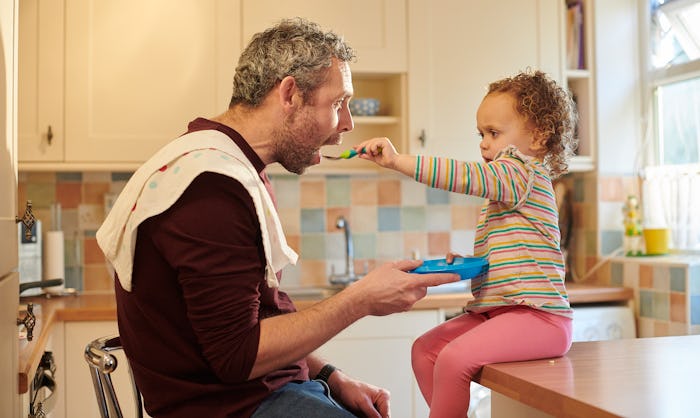Toddlers

This Is Why Your Toddler Wants To Feed You All The Time
Imitation is the sincerest form of flattery, right?
You have fed your little one in some way shape, or form since the day you brought them home, so it’s kind of a relief when they reach a point where they can feed themselves. Once they reach that milestone, though, it's like the tables turn and you’re suddenly wondering, why does my toddler keep feeding me? Whether they’re trying to share their own snacks or picking up food from your plate to feed to you, it’s an interesting new behavior, to say the least. So, what’s the deal?
Normal Toddler Development
“This is a normal process of development,” Kate Arquilla, M.S., R.N., C.B.C., who has years of experience in baby and child development, tells Romper in an email. “The act of eating is a very social event,” she explains, and around the time this behavior starts is when toddlers are also beginning to notice that mealtime brings people together.
While it’s great to encourage development, don’t feel pressured to let them constantly stick their germy hands into your mouth. “Playing along with your toddler is perfectly fine, as long as your child is not forcibly feeding you, or as long as the behavior does not become bothersome to you,” pediatrician Whitney Casares, M.D., M.P.H., tells Romper, “That fifth bite of carrots your child wants to give you might just not be appetizing anymore.” Politely declining someone’s offer of food is a socially acceptable thing to do, so even by saying “no thank you,” you’re still helping your toddler’s social development.
Exploration
Another reason your tot might be feeding you is that they’re simply doing what kids do best, exploring. “As toddlers grow and explore their world, they often offer their own food to others near them,” says Arquilla. She further explains that this behavior not only lets them test their boundaries but it may also help them try new foods. “Sharing food and offering food to others builds trust in the world around them and allows them to explore new foods in a way they feel safe.”
Mimicking & Pretend Play
Some of kids’ favorite toys include a play kitchen or child-size mops and brooms not because they have an early passion for cooking and cleaning but because they see their caregivers doing it frequently and they like to imitate behaviors. The same concept applies when they’re feeding you. “They may be mimicking [the same] feeding a parent has done with them,” says Dr. Casares. She further notes that this behavior can go on beyond the toddler stage, as kids often begin imitating behaviors, even more, when they are around three and/or four years old.
Your toddler feeding you might also be a sign that they’re starting to explore pretend play. Dr. Casares explains that a sign of this may be them also pretending to feed their dolls or stuffed animals. Again, if you don’t want to be fed by your toddler, that’s okay because they will continue to develop their sense of pretend play. “If you aren’t interested in being fed, or are done with this type of imaginary play, you can say ‘I’m full and don’t need any more’ or ‘Mommy’s all done’ in a kind tone,” says Dr. Casares.
Toddlers are developing and growing at a rapid rate, and this funny behavior is just another sign that things are right on track. Perhaps you could also use this time to reinforce the importance of handwashing since they’re going to keep insisting you eat their food by pushing their sticky hands right up to your mouth. Just an idea.
Experts:
Kate Arquilla, M.S., R.N., C.B.C., founder of Bumble Baby and an expert contributor for Tommee Tippee’s Spill the Milk series on motherhood and child development
Whitney Casares, M.D., M.P.H., author of The Working Mom Blueprint and founder of www.modernmommydoc.com
This article was originally published on